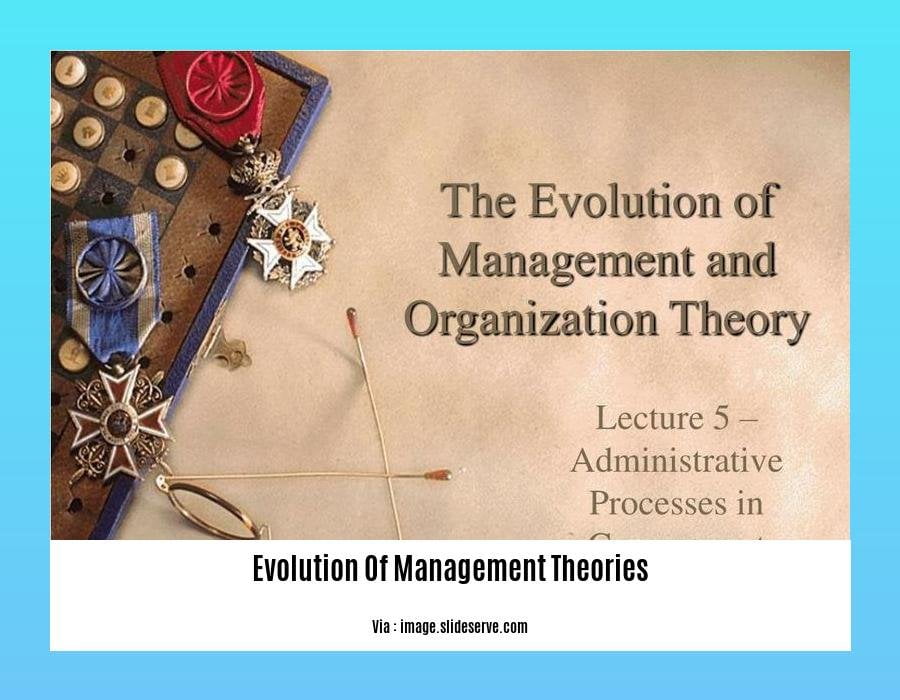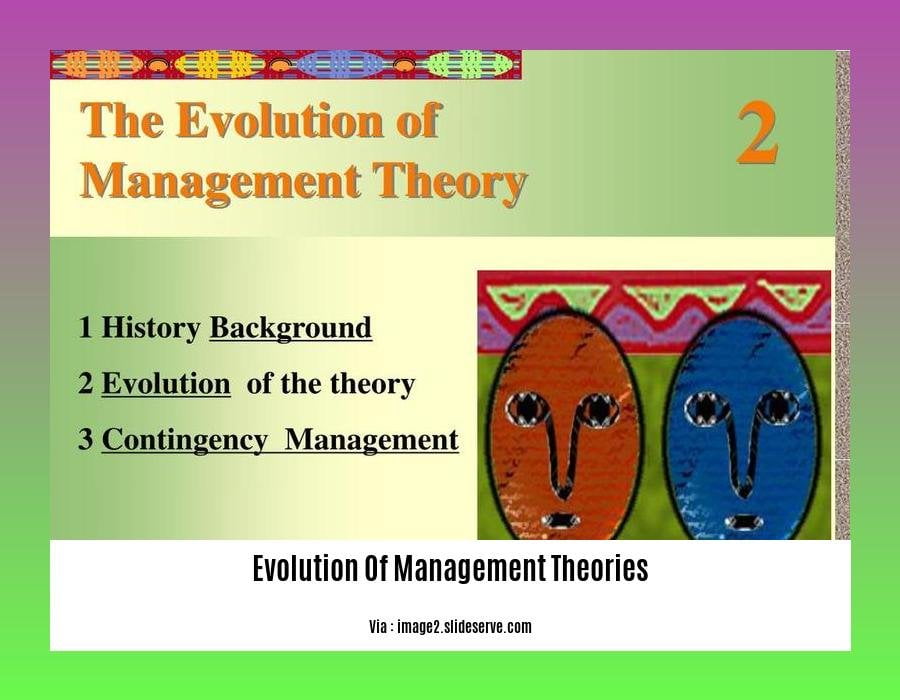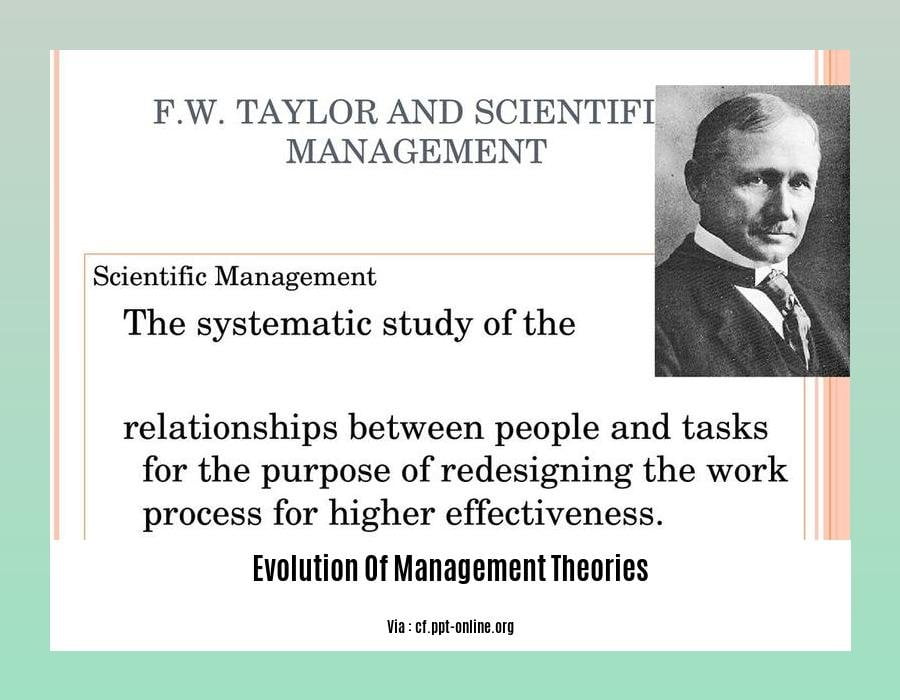The Evolution of Management Theories: Navigating Change and Growth for Organizational Success
Discover the fascinating journey of management theories and their profound impact on the business world. As companies continue to navigate through an ever-changing landscape, understanding the evolution of management theories becomes critical for achieving sustainable growth and organizational success. With over two decades of experience, our seasoned management consultant brings you expert insights into this dynamic field. From the early classical theories to the modern and agile approaches, we explore how these theories have shaped the way companies operate, enhancing productivity, employee satisfaction, and overall performance. Join us on this enlightening journey as we delve into the theories, analyze their relevance, and reveal strategies to adapt and thrive amidst today’s rapid changes.
Key Takeaways:
- The evolution of management theory has led to the development of various approaches that have shaped modern management principles and practices.
- The classical approach emphasizes hierarchy and clear roles, with influences from early thinkers like Henri Fayol and Frederick W. Taylor.
- The behavioural approach focuses on understanding and managing human behavior within organizations, highlighting employee motivation, job satisfaction, and effective communication.
- The quantitative approach improves decision-making through the use of mathematical and statistical models, tracing its roots back to Frederick W. Taylor’s scientific management principles.
- The systems approach views organizations as complex systems with interconnected parts, considering the impact of external factors on organizational functioning.
- The contingency approach emphasizes adaptation and flexibility, recognizing that management practices must be tailored to specific circumstances.
Evolution of Management Theories

The field of management has witnessed significant evolution over the years, as theorists and practitioners have explored different approaches to understand and improve the practice of management. In this article, we will delve into the five key management approaches that have shaped the principles and practices of modern management. We will explore the classical approach, the behavioural approach, the quantitative approach, the systems approach, and the contingency approach.
The Classical Approach
Let’s start with the oldest formal approach to management thought – the classical approach. This approach emphasizes the importance of establishing a well-defined hierarchy and clear roles and responsibilities within organizations. It can be traced back to ancient civilizations such as Egypt and Greece, where principles of leadership and hierarchical structures were observed.
In modern times, early classical management thinkers like Henri Fayol and Frederick W. Taylor laid the groundwork for this approach. Fayol emphasized the five functions of management – planning, organizing, commanding, coordinating, and controlling – while Taylor introduced scientific management principles to enhance efficiency and productivity.
The Behavioural Approach
The behavioural approach emerged in response to perceived weaknesses in the assumptions of the classical approach. It focuses on understanding and managing human behavior within organizations. This approach recognizes the importance of employee motivation, job satisfaction, and effective communication in achieving organizational goals.
Key contributors to the behavioural approach include Mary Parker Follett, Elton Mayo, and Abraham Maslow. Follett emphasized the significance of employee participation and collaboration, Mayo conducted the famous Hawthorne studies highlighting the impact of human relations on productivity, and Maslow introduced the hierarchy of needs theory, which underscores the importance of fulfilling psychological and social needs for employee motivation.
The Quantitative Approach
The quantitative approach aims to improve decision-making through the application of quantitative techniques. Its roots can be traced back to the scientific management principles introduced by Frederick W. Taylor. This approach emphasizes the use of mathematical and statistical models to analyze and solve management problems.
Fields like Management Science and Operations Research have evolved as branches of the quantitative approach. These disciplines enable managers to make informed decisions based on data, utilizing techniques such as statistical analysis, optimization, simulation, and forecasting.
The Systems Approach
The systems approach to management views organizations as complex systems with interconnected parts. It focuses on understanding the relationships and interactions between various components of the organization. This approach considers the organization as a whole and recognizes the impact of external environmental factors on its functioning.
The systems approach was influenced by the work of Ludwig von Bertalanffy and is essential in modern management practices. By taking a holistic view of organizations, managers can better understand the interdependencies between different departments, functions, and external stakeholders, enabling them to make more informed decisions.
The Contingency Approach
The contingency approach suggests that there is no one-size-fits-all solution to management problems. It emphasizes the importance of adapting management practices to fit the specific circumstances or contingencies. This approach acknowledges that what works in one situation may not work in another and advocates for a flexible and adaptable managerial approach.
Management scholars like Joan Woodward and Fred Fiedler popularized the contingency approach. Woodward’s research on organizational structures and technology highlighted the need for different approaches in different contexts, while Fiedler’s contingency theory emphasized the importance of matching leadership styles to situational factors.
In Conclusion
The evolution of management theory can be traced through the development of these five management approaches – the classical, behavioural, quantitative, systems, and contingency approaches. These approaches have provided valuable insights into the practice of management and have contributed to the modern principles and practices of effective management.
By understanding the evolution of management theories, organizations can navigate change and growth more effectively. Managers can draw upon the wisdom of these theories, adapting and applying them to the unique challenges and opportunities they face in the dynamic business landscape.
GetupLearn.com is an excellent resource for further exploration of the evolution of management theories and its impact on today’s organizations.
References:
- “Evolution of Management Theory: 5 Management Approaches.” getuplearn.com. Link
- “The Evolution of Management Theories: A Literature Review.” researchgate.net. Link
Evolution Benefits are fascinating to explore, so let’s dive into the advantages it brings. Discover more about them by clicking on evolution benefits.
Intrigued by the evolution of horses? Learn about the incredible journey through time with evolution of horse byju and witness their remarkable transformations.
Curious about the evolution of management? Uncover the dynamic changes it has undergone by clicking on explain evolution of management and delve into the fascinating world of organizational development.
Interested in a comprehensive understanding of the evolution of management? Satiate your curiosity by exploring explain the evolution of management and gain insights into the historical progression of managerial practices.
The Human Relations Movement and Its Impact on Management Theories

The human relations movement has had a profound impact on the evolution of management theories. As organizations began to recognize the importance of the social and psychological aspects of work, a shift occurred from the traditional focus on efficiency and productivity to a more people-centric approach. Let’s delve into the key aspects of the human relations movement and its influence on management theories.
Understanding the Human Relations Movement
The human relations movement emerged as a response to the limitations of scientific management in addressing the social needs of employees. It emphasized the significance of understanding and valuing the needs and motivations of individuals in the workplace. Instead of viewing employees as mere cogs in a machine, this movement recognized their unique contributions and the impact of their satisfaction on overall organizational performance.
Elton Mayo, an Australian psychologist, conducted the famous Hawthorne studies, which were instrumental in shaping the human relations movement. These studies revealed the influence of social and psychological factors on employee behavior and productivity. Mayo’s research emphasized the importance of employee satisfaction, teamwork, and motivational factors in achieving organizational goals.
Influencing Management Theories
The human relations movement challenged the established principles of scientific management by highlighting the importance of employee satisfaction, motivation, and social interactions. This perspective led to the development of contemporary management theories that prioritize employee engagement, participatory decision-making, and leadership styles that promote teamwork and collaboration.
One key impact of the human relations movement on management theories is the recognition of the importance of employee satisfaction. Research has shown that satisfied employees are more likely to be engaged, productive, and innovative, leading to improved organizational performance. Companies now prioritize creating a positive work environment, fostering open communication, and providing opportunities for personal and professional growth.
Another significant influence of the human relations movement is the emphasis on participatory decision-making. This approach recognizes that employees have valuable insights and perspectives to contribute to the decision-making process. By involving employees in decision-making, organizations can tap into diverse ideas, enhance commitment and ownership, and achieve better outcomes.
Furthermore, the human relations movement has underscored the need for effective leadership styles that promote collaboration and teamwork. Instead of relying on hierarchical authority, contemporary management theories promote leaders who inspire, empower, and support their teams. This transformational leadership approach fosters a culture of trust, communication, and shared goals, resulting in higher employee engagement and organizational success.
Key Takeaways:
- The human relations movement emerged in response to the limitations of scientific management and focused on understanding and valuing the social and psychological aspects of work.
- The movement emphasized employee satisfaction, teamwork, and motivational factors as key drivers of organizational success.
- The human relations movement influenced contemporary management theories that prioritize employee engagement, participatory decision-making, and leadership styles that foster collaboration.
- Recognizing the significance of employee satisfaction, organizations now prioritize creating a positive work environment, open communication, and opportunities for personal and professional growth.
- Participatory decision-making allows organizations to tap into diverse ideas, enhance commitment and ownership, and achieve better outcomes.
- Effective leadership styles that promote collaboration and teamwork have become integral to contemporary management practices.
Sources:
– Human Relations Era: Behavioural Theories of Leadership
– Human Relations Movement: How It Changed Management
The Emergence and Influence of the Systems Theory
The systems theory has emerged as a significant contributor to the evolution of management theories, revolutionizing our understanding of organizations and their dynamics. This article explores the emergence and influence of the systems theory, examining how it has shaped management practices and paved the way for a holistic approach to organizational success.
Understanding the Systems Theory
The systems theory views organizations as complex systems, consisting of interconnected and interdependent parts that work together to achieve common goals. It recognizes that every decision and action within an organization can have ripple effects on other parts of the system. By understanding the relationships and interactions between different elements, the systems theory enables managers to optimize processes and outcomes.
The Emergence of the Systems Theory
The systems theory emerged as a response to the limitations of traditional management theories that focused on isolated factors and linear cause-and-effect relationships. It gained prominence in the mid-20th century, influenced by advancements in cybernetics, biology, and general systems thinking.
The systems theory emphasized the interconnectivity and interdependence of various components within an organization, challenging the reductionist approach of earlier theories. It introduced a more holistic perspective, considering the organization as a whole and examining the relationships between its parts.
Influence on Management Practices
One of the key contributions of the systems theory is its impact on management practices. It has led to a shift from a narrow focus on individual departments and functions to a more integrated and collaborative approach.
The systems theory recognizes the intricate relationships between different departments, processes, and individuals within an organization. It emphasizes the importance of effective communication, collaboration, and coordination to achieve organizational goals. By promoting a systemic perspective, the systems theory enhances organizational efficiency and productivity.
Systems Thinking in Modern Organizations
Modern organizations that embrace the systems theory benefit from a range of advantages. They can proactively identify and anticipate potential issues, considering the broader implications of their actions. Instead of addressing problems in isolation, they take a systemic approach, understanding the interconnectedness between factors.
By adopting systems thinking, organizations can better adapt to change, navigate complexity, and promote innovation. They can identify opportunities for improvement, optimize processes, and enhance overall performance. The systems theory provides a framework for robust decision-making, enabling organizations to align their actions with long-term goals and success.
Key Takeaways:
- The systems theory views organizations as complex systems with interconnected and interdependent parts.
- It emerged as a response to the limitations of traditional management theories.
- The systems theory emphasizes the holistic perspective and interconnectivity of an organization.
- It has influenced management practices by promoting collaboration, coordination, and effective communication.
- Organizations that embrace systems thinking benefit from improved adaptability, efficiency, and innovation.
Sources:
– The Emergence of General System Theory: From Biology to Cybernetics
– Systems Theory
Contemporary Management Theories and Their Focus on Flexibility and Innovation
Contemporary management theories have evolved to address the complexities of modern business practices, emphasizing flexibility, innovation, and strategic thinking. In this article, we will explore the evolution of management theories and their impact on organizations seeking to navigate change and drive growth.
The Evolution of Management Theories
Management theories have undergone significant development over time, reflecting the changing needs and challenges of the business landscape. These theories provide valuable insights and frameworks for leaders and managers, enabling them to adapt to dynamic workplaces and drive organizational success.
Early Management Theories
Two influential early management theories laid the foundation for contemporary management practices.
-
Frederick Taylor’s Scientific Management Theory: Developed in 1911, Taylor’s theory focused on maximizing efficiency and productivity through scientific methods. It emphasized the division of labor, task specialization, and the use of time-motion studies to determine the most efficient way of performing tasks.
-
Source: The Evolution of Management Theories: A Literature Review
-
Max Weber’s Bureaucratic Theory: Weber’s theory, introduced in the early 20th century, focused on the rational and efficient organization of large-scale bureaucratic systems. It emphasized the importance of formal rules, hierarchy, division of labor, and impersonality in achieving organizational efficiency.
-
Source: The Evolution of Management Theories: A Literature Review
The Emergence of the Human Relations Movement
The human relations movement marked a significant shift in management theories, addressing the social aspects of work and the importance of employee satisfaction and motivation. This movement has had a lasting impact on contemporary management theories.
-
Definition of the Human Relations Movement: This movement emerged as a response to the shortcomings of scientific management in addressing the social aspects of work. It emphasized the importance of understanding and valuing the needs and motivations of employees to enhance productivity and performance.
-
Source: Human Relations Era: Behavioural Theories of Leadership
-
Elton Mayo’s Contributions: Elton Mayo’s Hawthorne studies conducted in the 1920s and 1930s revealed the significance of social and psychological factors in influencing employee behavior and productivity. This research led to the development of the human relations theory, highlighting the importance of employee satisfaction, teamwork, and motivational factors in achieving organizational goals.
-
Source: Human Relations Era: Behavioural Theories of Leadership
-
Impact of the Human Relations Movement on Management Theory: The human relations movement challenged the previous Tayloristic approach by emphasizing the importance of employee satisfaction, motivation, and social interaction in the workplace. It influenced contemporary management theories that focus on employee engagement, participatory decision-making, and leadership styles that promote teamwork and collaboration.
-
Source: Human Relations Movement: How It Changed Management
Key Takeaways:
- Management theories have evolved to address the complexities of contemporary management practices.
- The early theories of scientific management and bureaucratic theory laid the foundation for modern management principles.
- The human relations movement emphasized the importance of employee satisfaction, motivation, and social interaction in the workplace.
- Contemporary management theories emphasize flexibility, innovation, and strategic thinking.
- These theories provide valuable insights and frameworks for leaders and managers to adapt to dynamic workplaces.
Note: For a more detailed exploration of the evolution of management theories and their impact, please refer to the cited sources.
Sources:
– The Evolution of Management Theories: A Literature Review
– Human Relations Era: Behavioural Theories of Leadership
FAQ
Q1: What is the significance of the evolution of management theories?
A1: The evolution of management theories is significant because it provides valuable insights and frameworks for leaders and managers to navigate the complexities of contemporary management practices and adapt to dynamic workplaces.
Q2: What are some key types of management theories?
A2: Some key types of management theories include classical management theory, neo-classical management theory, and modern management theory. These theories have evolved over time to address the changing needs of organizations and workers.
Q3: How does human resource management (HRM) play a role in the evolution of management theories?
A3: Human resource management (HRM) plays a significant role in the evolution of management theories. It focuses on understanding and managing human behavior within organizations and recognizes the importance of employee motivation, job satisfaction, and effective communication in achieving organizational goals.
Q4: Is innovation management important in contemporary management?
A4: Yes, innovation management is crucial in contemporary management. It involves making changes and innovations to make businesses globally renowned. Contemporary management emphasizes flexibility, innovation, and strategic thinking to navigate modern challenges in business.
Q5: Why do managers need a strong foundation in management theory?
A5: Managers need a strong foundation in management theory to effectively navigate challenges in organizations. Management theories provide a basis for understanding best practices, decision-making frameworks, and strategies that can enhance productivity, employee satisfaction, and overall organizational performance.
- Unveiling Bernhard Caesar Einstein’s Scientific Achievements: A Legacy in Engineering - July 15, 2025
- Uncover who is Jerry McSorley: CEO, Family Man, Business Success Story - July 15, 2025
- Discover Bernhard Caesar Einstein’s Scientific Contributions: Unveiling a Legacy Beyond Einstein - July 15, 2025















